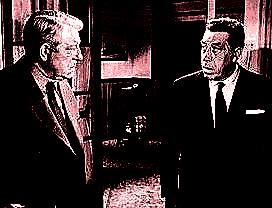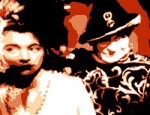Film Review

L'Âge ingrat was directed by Gilles Grangier, who was renowned at the time in France for his popular film comedies which featured big name actors. Whilst the French New Wave was making its mark, traditional directors such as Grangier continued to churn out uninspired fare such as this, feeding the popular demand for unchallenging cinema without offering much in the way of artistic flair or imagination. Whilst L'Âge ingrat has a certain charm, with one or two amusing comic interludes, it's overall pretty dull and anaemic, with neither Gabin nor Fernandel at anything like his best.
© James Travers 2002
The above content is owned by frenchfilms.org and must not be copied.
Film Synopsis
After meeting in Paris whilst studying for a degree, Antoine Lartigue and Marie Malhouin soon discover they are in love and agree to tie the connubial knot as soon as they can. Before doing so, they decide it might be a good idea if their families got to know each other a bit better. As Marie's parents lives in Normandy, a region that sees far more rain than sun, Antoine anticipates that they will welcome a few weeks' carefree holiday in his part of the world, which is sunny Provence. As it turns out, he couldn't be more wrong. Marie's hard-to-please father, Émile, finds nothing remotely attractive about the sun-scorched Riviera, which is far too hot and crowded for his liking.Antoine's own father, Adolphe, likewise has plenty to moan about. Dismayed by the miserable attitude of his rude Normandy guest, he begins to wish that Émile had stayed at home in the rain-sodden north. After a fairly belligerent start to their holiday, the two old men finally manage to set aside their differences and soon they are acting as if they are the best of friends. Unfortunately, by this stage a rift has developed between the young lovers. After a fierce row, Marie runs off by herself and Antoine goes hurrying after her. Now an inseparable pair, Émile and Adolphe join forces and throw themselves into the task of reuniting their wayward offspring before the rift becomes permanent...
© James Travers
The above content is owned by frenchfilms.org and must not be copied.
Similar Films
Here are some other films you may enjoy watching:- Sur le banc (1955)
- Bless This House (1972)
- Candide ou l'optimisme au XXe siècle (1960)
- Les Vignes du Seigneur (1958)
- Carry on Abroad (1972)
Other related links:
Film Credits
- Director: Gilles Grangier
- Script: Pascal Jardin, Claude Sautet, Gilles Grangier
- Cinematographer: Robert Lefebvre
- Music: Georges Delerue
- Cast: Jean Gabin (Émile Malhouin), Fernandel (Adolphe Lartigue), Marie Dubois (Marie Malhouin), Paulette Dubost (Françoise Malhouin), Claude Mann (Charles-Édouard), Madeleine Sylvain (Éliane Lartigue), Christine Simon (Florence Malhouin), Rellys (Monsieur Corbidas), Franck Cabot-David (Henri Lartigue), Nicole Courget (Sophie Malhouin), Joël Monteilhet (Jules Lartigue), Georges Rostan (Max Lartigue), Noël Roquevert (L'estivant), Franck Fernandel (Antoine Lartigue), Max Amyl (Le concierge de l'hôtel), Andrex (Le camionneur), Claudine Berg (Susanne, la boulangère), Riri Beuf (Madame Corbidas), Pierre Decazes (Le cycliste), Jean Lescot (Un copain d'Antoine)
- Country: France
- Language: French
- Support: Black and White
- Runtime: 95 min
- Aka: That Tender Age ; L'âge ingrat
French cinema during the Nazi Occupation

The best French Films of the 1910s

Kafka's tortuous trial of love
